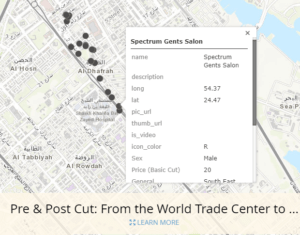Associate Professor of Digital Humanities, David Wrisley, worked with students in his two fall 2018 classes to describe and archive their scholarship. In collaboration with NYU New York’s Digital Scholarship Services unit and the Center for Digital Scholarship in the NYUAD Library, students in his Data and Human Space and Digital Curation courses produced work using NYU Web Publishing, Omeka and NYU Web Hosting to explore what it means to curate content online and to analyze the ways spatial data is used in our daily lives.
Using a metadata template based on the Dublin Core schema and the searchFAST subject headings, students were able to describe their websites in ways that make them discoverable and accessible to outside users. Students exported their WordPress or Omeka sites from NYU Hosting as zip files, which will then be uploaded to Professor Wrisley’s collection as a separate sub-collection within NYU’s Faculty Digital Archive so that they exist in perpetuity. Students were given the opportunity to make their web publications public or private, with the public data being published soon.
 Students in the Data and Human Space course were also required to produce their own boutique geospatial data sets, which were highlighted or embedded on their sites. Many of the students’ data sets were related to life in Abu Dhabi and the Emirates, such as barber shop locations near WTC and artists in the UAE. Some data sets were highly localized to the NYUAD campus like where posters are hung and how people are using library spaces. Students used a variety of methods to capture their geospatial data, including crowd-sourcing information from Twitter, web-scraping tools, and ArcGIS Survey123. In addition to archiving the WordPress sites, the students learned about describing their own geospatial data for submission to the NYU Spatial Data Repository.
Students in the Data and Human Space course were also required to produce their own boutique geospatial data sets, which were highlighted or embedded on their sites. Many of the students’ data sets were related to life in Abu Dhabi and the Emirates, such as barber shop locations near WTC and artists in the UAE. Some data sets were highly localized to the NYUAD campus like where posters are hung and how people are using library spaces. Students used a variety of methods to capture their geospatial data, including crowd-sourcing information from Twitter, web-scraping tools, and ArcGIS Survey123. In addition to archiving the WordPress sites, the students learned about describing their own geospatial data for submission to the NYU Spatial Data Repository.
This pilot project using the FDA for archiving student scholarship will enable us to explore what it means and how it works to preserve non-traditional and digitally-focused research in an institutional repository for perpetual access and open discovery. The exploration of geospatial data in daily life allowed students to examine places they interact with at a more granular level, while having conversations around open data and open scholarship.